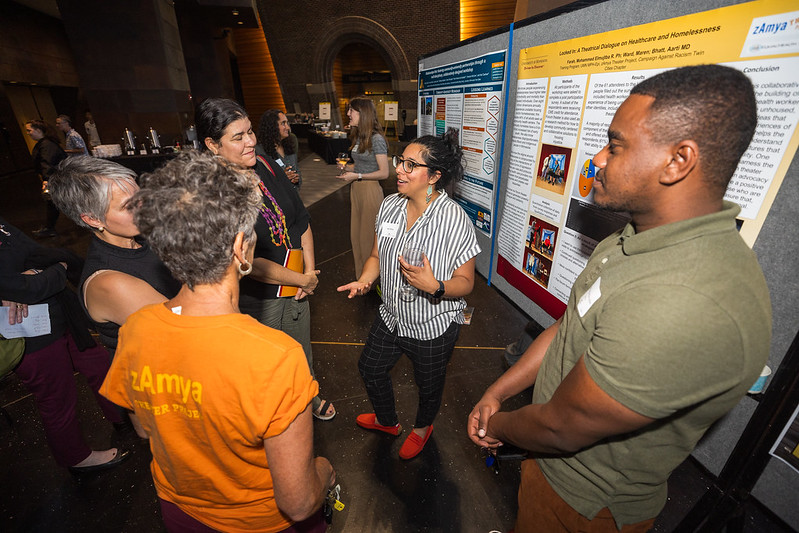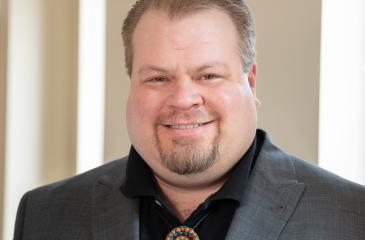Every year since 2012, the Clinical and Translational Science Institute (CTSI) has offered two summer training programs. The PReP program provides an opportunity for undergraduate students from populations underrepresented in research to begin or advance their research career, while the A-PReP program is for doctoral-level professional health sciences students and early PhD students who are interested in clinical and translational research.
Casey Dorr, PhD, was named co-director of these two summer programs in 2021. He is an Investigator in the Hennepin Healthcare Research Institute’s Department of Nephrology, an Assistant Professor in the UMN Department of Medicine’s Renal and Hypertension Division, and a current scholar in the CTSI K-R01 Transition to Independence Program. Dorr is also a first generation descendant of the Mille Lacs Band of Ojibwe with a long-standing mission to improve health outcomes in minority communities through biomedical research.
In addition to being an accomplished researcher, Dorr brings firsthand experience with summer research programs to his appointment at CTSI. As an undergraduate at the University of Minnesota Duluth, he participated in what was then called the Multicultural Undergraduate Research Program at the UMN-Twin Cities campus.
“I applied to this program because I needed a summer job,” said Dorr. “It was a full-time job where I could actually make money doing science. That really started my research career.”
Dorr offered some thoughts on how students can make the most out of their experience in the CTSI Pathways to Research Program (PReP) for undergraduate students or the Advanced Pathways to Research Program (A-PReP) for doctoral-level professional health sciences students and early PhD students.
An open mind and a strong desire to learn are key
“Not all students will have this opportunity,” said Dorr. “I think the best thing they can do to prepare is to come in with an open mind and a strong desire to learn. They also need to work closely with their mentor and see the work through.”
CTSI requires each student and mentor pair to sign a mentor-mentee compact. The compact ensures that they start the summer off on the same page and set expectations with each other, and they identify milestones that need to be met.

“It's important that the mentor is investing the time into that student over the summer and that they have regular meetings,” said Dorr. “This may be the first research experience ever, especially for the undergraduate students. One of the big things is that they just want to learn research methods and presentation skills.”
The programs also focus on career development, well-being, resilience, and networking. Students learn writing and presentation skills on how to present their science.
Dorr and CTSI staff focus on creating a welcoming environment where students can come in and feel free to be themselves. They encourage participants to be authentic and genuine to who they are, and to embrace other people's individuality and diversity of thought. This creates a learning environment where participants help each other learn.
Invaluable connections and support
Beyond providing a paid summer position and valuable experience, Dorr believes that the PReP and A-PReP programs give students a leg up against the competition when they apply to their next thing, whether that’s a job, graduate school, medical school, or another health sciences program.
“They now have this experience,” said Dorr. “On applications they can include their degree plus this paid experience. Another bonus of these programs is that they now have new connections who can provide reference letters for their next chapter in life.”
Dorr also encourages students to check out organizations like the American Indian Science and Engineering Society (AISES) and the Society for the Advancement of Chicanos/Hispanics and Native Americans in Science (SACNAS), where Dorr will serve as chair-elect for the Native American Affairs Committee in 2024. Both organizations have student chapters at the University of Minnesota.
“These societies bring you into contact with other people that are in similar situations,” said Dorr. “So if you're a Native or Hispanic scientist and you don't know any other Native or Hispanic scientists, these societies help you to meet them. You find other like-minded people who share a similar culture. And these are nationwide networks with annual conferences where you get to know people throughout the whole country and you start to develop a nationwide network of people that really value culture and science.”
Dorr is a strong believer in increasing diversity of thought and culture in science. Science and research are based on innovation, and people from different cultures have different ways of thinking and different experiences in life that help them think differently.
“CTSI works a lot on team science and when you have a team of people with different ideas and different thoughts, and you work together, you can develop new, innovative ways of solving problems,” said Dorr. “And scientists really are problem solvers.”
The application deadline for the summer 2024 PReP and A-PReP programs is February 9, 2024. Questions about the programs or the application process can be directed to CTSI Education staff at [email protected] or by calling 612-625-2022.
